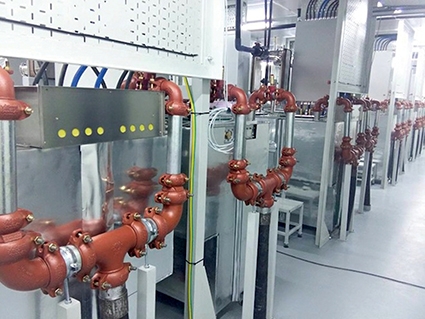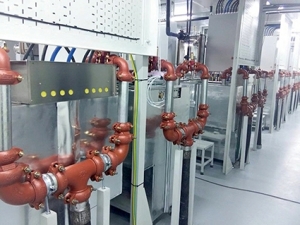Dechert OnPoint: Georgia Launches First Technological Center
Dechert Georgia, through the contribution of partners Archil Giorgadze and Nicola Mariani, joined by senior associates Ruslan Akhalaia and Irakli Sokolovski, as well as Ana Kostava and Ana Kochiashvili, is partnering with Georgia Today on a regular section of the paper which will provide updated information regarding significant legal changes and developments in Georgia. In particular, we will highlight significant issues which may impact businesses operating in Georgia.
Dechert’s Tbilisi office combines local service and full corporate, tax and finance support with the global knowledge that comes with being part of a worldwide legal practice.
Dechert Georgia is the Tbilisi branch of Dechert LLP, a global specialist law firm that focuses on core transactional and litigation practices, providing world-class services to major corporations, financial institutions and private funds worldwide. With more than 900 Lawyers in our global practice groups working in 27 offices across Europe, the CIS, Asia, the Middle East and the United States, Dechert has the resources to deliver seamless, high quality legal services to clients worldwide. For more information, please visit www.dechert.com or contact Nicola Mariani at nicola.mariani@dechert.com.
On 30 November 2015 Georgia’s third-largest free industrial zone opened for operation at a 17 hectare non-agricultural land plot located in the Gldani district of Tbilisi, Georgia. The zone, named Tbilisi Technological Park Free Industrial Zone (the “Tbilisi FIZ”), will be functional for 49 years under the management and administration of Georgia Technology Park LLC (the “Administrator”), which is a wholly owned subsidiary of the Dutch company BitFury Holding B.V.
An aspect differentiating the Tbilisi FIZ from existing free industrial zones, which concentrate on manufacturing and processing industries, is a focus on the research and development of various technologies and innovations. In this regard, the first project implemented in the Tbilisi FIZ is the construction and exploitation of a data center. The center is equipped with an innovative 40 MW energy efficient cooling system and aims to attract international IT companies to the Georgian market. The Administrator is already in talks with several foreign pharmaceutical and light industry companies which have expressed interest in entering the Tbilisi FIZ.
The Tbilisi FIZ is conveniently located near Tbilisi International Airport and major land transit routes. The free zone offers 26 land plots to potential investors, with the Administrator offering potential investors a comprehensive package of services covering all stages of operation, including the possibility to join and merge land plots according to the investor’s needs.
The Administrator intends to invest USD 30,000,000 in the Tbilisi FIZ. It is expected that the aggregate volume of investment in the Tbilisi FIZ will amount to USD 100,000,000. Except for the benefits offered by the Administrator, the Tbilisi FIZ enjoys further benefits applicable to free industrial zones under Georgian legislation.
In particular, benefits provided for free industrial zones under Georgian legislation include the exemption of free industrial zone enterprises from the obligation to obtain licenses/permits for the following activities:
• production and packaging of infants’ food products;
• production and packaging of children’s food products;
• production of electricity;
• transmission of electricity;
• distribution of electricity;
• distribution of natural gas;
• transportation of natural gas;
• transit of products subject to veterinary control;
• exploitation of hazardous industry objects;
• local urban regular transportation of passengers;
• international transportation of cargo (above the quota defined in an international agreement) from the territory of Georgia by a foreign carrier;
• clinical research of pharmacological substances;
• production of pharmaceutical substances (medical treatment substances, except for drug substances);
• setting up of a group I pharmacy;
• setting up of a group II pharmacy;
• setting up of a pharmacy point;
• import of non-iodized salt.
A simplified procedure also applies to permits issued for construction in free industrial zones. Namely, the construction permit is used by the Administrator with a single-stage proceeding upon submission of project documentation elaborated in compliance with the parameters of the plan for developing the free industrial zone territory.
Further advantages of free industrial zones include the absence of limitations on the currency used in payments. More importantly, the following tax exemptions apply to free industrial zones and FIZ enterprises:
• Profit from business permitted in and gained by a free industrial zone enterprise within the free industrial zone shall be exempted from profit tax, except in the cases provided in the Tax Code of Georgia;
• Import of foreign goods in a free industrial zone shall be exempt from value-added tax;
• Transactions within a free industrial zone shall be exempt from value-added tax;
• Property within a free industrial zone shall be exempt from property tax;
• Import of foreign goods in a free industrial zone shall be exempt from import tax;
• Supply of good and delivery of services between free industrial zone enterprises shall be exempt from VAT; and
• Import of goods produced within a free industrial zone to the territory of Georgia (outside the free industrial zone) shall be exempt from import tax. For the purposes of exemption from import tax, the Ministry of Finance sets detailed criteria by a separate order.
The activities restricted in free industrial zones include: (a) construction and residential use of buildings and capital and temporary facilities of dwelling and hospitality designation; (b) production of or trade with weapons and ammunition; (c) production of and trade with nuclear and radioactive substances; (d) import, storage, production and/or realization of drug and psychotropic substances; and (e) import, storage, production and/or realization of tobacco products or tobacco raw materials, unless designated for local use. Other restrictions and limitations of the Georgian legislation also apply to operations on free industrial zones.












